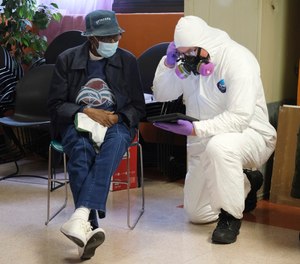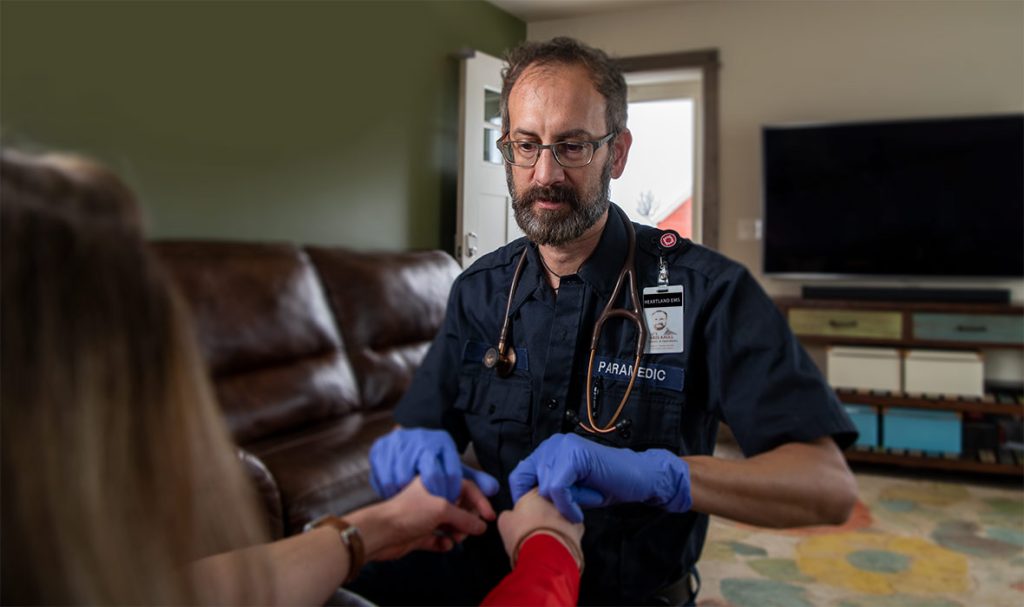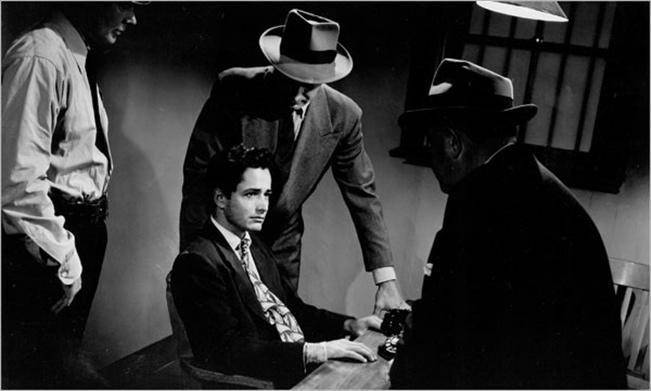Managing The Patient History
Published (updated: ).
The Basics

The interview is always the same and follows a set pattern of questions. Questions that occur to the ambulance crew after this conversation would be referred to as a follow up question.
- Subjective – This is the patient’s chief complaint as defined in terms of onset, provocation, quality, radiation, severity, and time. The patient says they have chest pain, then the medics ask about OPQRST (onset, provocation, quality, radiation, severity, and time).
- Allergies – The patient is probably allergic to a medication. Having a drug allergy means that when the patient takes the medication they have an allergic reaction. Many patients will confuse a medications side effect with an allergy. Not a problem for the ambulance crew. Simply write down the allergy and what happens when they take the medication.
- Medications – Patients are prescribed numerous medications. The EMS crew should write down each medication, the dosage for each mediation, and how many times they take the medication per day. Having a good list of medications is important to the rest of the health care team.
- Previous medical history – Inquire about the patient’s medical history. What medical conditions are they being treated for? What surgeries have they had? Is the patient undergoing some sort of holistic health treatment such as exercising, special diet, or fasting?
- Last meal or oral intake – What was the last thing the patient ate. It doesn’t make that big of a deal most of the time, but if the patient needs surgery, the anesthesiologists are definitely going to want to know.
- Events preceding the complaint – What was the patient doing before they started experiencing the pain that led them to call 911?
Any question formulated after having this conversation would be referred to as a follow up question. Examples of follow up questions could be:
- Do you have any plans to kill yourself?
- Did you go back to the same doctor after the incident?
- Have you ever eaten octopus before?
Awkward Patients

Sometimes the patient’s problem leads the patient interview in a direction that the patient really doesn’t want to travel. The patient probably doesn’t want to confide in EMS how much alcohol they consume. No patient is really that forthcoming about the drug use. Perhaps the call was made in relation to something more personal, like sex or physical abuse (or both). In these situations, the medics may choose to ask specific follow up questions to fill in the gaps in the patient’s story.
Overly talkative patients may be employing a strategy to tell the medics everything except what they need to know. The best strategy is to let them talk and try to write it down. After a few minutes, the patient will be open to answering questions from the medics. Guaranteed the bulk of what the patient tells EMS will not be helpful, but letting the patient speak freely will build rapport and allow the medics to gain the patient’s trust for a decent interview.
Anxiety is a common problem that results in ambulance calls. In these situations, being sensitive that the patient is emotional is helpful in managing these encounters. Calming reassurance can be achieved simply by being by the patient’s side and not over reacting. Allowing the patient to emote will build rapport with the patient.
On the flip side of anxiety and over-talkative patients, the medics may encounter silent patients. Some people are quiet by nature. Some people are quiet when they are angry. If the patient does not confide in EMS due to their silence, the medics may need to consider the possibility that the patient may have been slighted by something the medics said or did. The patient may be telling the medics about their problems with their body language. When in doubt, take a moment and think about the interaction. Patients who are silent are playing a chess game. Think about the next move.
Uncooperative Patients
Sometimes, patients are angry. Maybe angry at themselves, the situation they are in, or the fact that it took 30 minutes for the ambulance to arrive on scene. Whatever the case, getting angry at the patient won’t help the situation. Cooler heads always prevail.
Intoxicated or high patients will probably require more patience than other patients. Avoid trapping the patient in small areas. The medics should ensure that at no time are they alone with the patient, at least until some rapport has been made. The key to handling intoxicated patients is to treat them with dignity and respect.
Emotionally volatile (crying) patients can be just as challenging as intoxicated patients. Depressed patients may be quiet. In either case, remember that the ambulance is here to help the patient in their time of need. Being patient and non judgmental with these patients will go a long way.
Sometimes Patients Just Don’t Make Any Sense

Patient stories vary from patient to patient, however sometimes they just don’t make any sense. Perhaps the patient has limited cognitive ability. Patients with limited cognitive ability still know what’s going on, they just need more time to articulate their story. Sometimes the patient will say something then contradict their story later in the interview. Be alert to omissions but don’t be tempted to cross examine the patient, this is an interview, not an interrogation.
Sometimes there is a language barrier. In these instances, finding a translator might be as easy as asking a family member or bystander to help. Other times, the medics may need to employ the use of a language line or some other aid to conduct the interview.
Patient’s with hearing problems can be extremely difficult to interview. While nobody is expecting the medics to be able to converse with the patient with sign language, the expectation is that the medics will get the story straight. It may be necessary to write down the questions on a piece of paper and have the patient write their responses down. The good part about a written interview is that the medics can just provide the written interview to the nurse at the emergency room (who will be impressed with medics who have such amazing patience). Patients with vision impairments will need to be warned of every move the medics need to to make to conduct their assessment of the patient.
When obtaining information from family and friends, the medics should be aware that there is usually only one person in the room that will know the patient’s story and be able to articulate the problem. Finding a quality third party on a call can make a difficult medical interview much easier.
